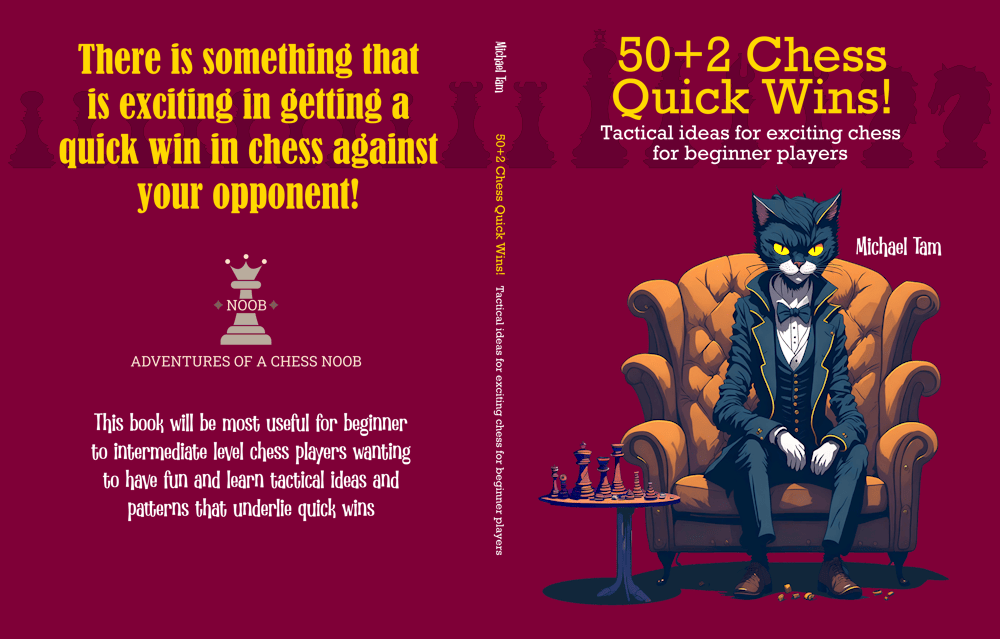
Four Knights Scotch | TRIPLED Pawns Comeback! ♟️♟️♟️😊
#fourknights #scotch #tripledpawns #comeback
This might be a bit perverse, but making a reversal, a comeback, from a losing position is one of my secret joys in chess! 😅 Now, that doesn’t mean that I deliberately play bad openings, but when I make a mistake and find myself in a losing middlegame, I find it fun to treat this as a challenge, rather than to immediately give up and resign.
I recently had the following game where I unthinkingly blitzed out a careless move on turn 6 (6… d6?). This was in a game of 15+10 rapid, where I had the Black pieces, and White played a Four Knights Game: Scotch Variation. Almost immediately, I realised that I should have retreated my bishop with (6… Bb6)…

![]()
And the reason for this is that after trading knights and then bishops (7. Nxc6 bxc6 8. Bxc5 dxc5), I now had a tower of tripledc-pawns! Despite material equality, Stockfish evaluates the position as highly disadvantageous at [+2.6]! 😂

![]()
White immediately pounces to try to solidify their advantage by trading queens, and then long castling. So, not only do I have the “tower”, but I’ve also lost the right to castle! However, I do have material equality and now a clear purpose! To get a reversal/comeback, I’ll need to consolidate, avoid trading away too many pieces, and try not to make the tripled pawns a disadvantage!
With White having castled queenside, this provides a tactical target. A consequence of the c-pawn tower is that my b-file was semi-open. So logically, develop/move pieces to the queenside to attack White’s king. Whether it is directly successful or not, it places pressure on White to defend. Putting threatening pressure on the opponent has the effect that it requires the opponent to respond accurately. Framed in another way, it invites our opponents to make a mistake or a blunder!
In this game, several of the threats that I make were not considered by the engine to have been the most accurate moves. However, they largely worked! Often against the attack, White responds inaccurately. For instance, against my “mistake” of (17… Ne5), threatening White’s light square bishop on c4, White chose to counterattack my higher value rook with their c-pawn (18. c3?). From a simple tactical heuristic perspective, it seems to make sense. White wants to trade down material to simplify into a winning endgame, so they don’t need to move away from attacks. However, in this case, it was a mistake as after (18… Nxc4), my knight had another attack on White’s d2-rook! White was forced to capture my knight rather than my rook (19. Bxc4?), and suddenly, the evaluation is near equal!
A bit flustered, White played (20. Rb2), seeking to take control of the open b-file. Although the engine thinks that this move was fine, my view is that it was a tactical mistake from a human perspective as it allowed for (20… Rxc3+). Although the evaluation was equal, this transformed my remaining doubled c-pawns into passed pawns! The liability has now become one of my greatest assets!
From a meta viewpoint, we’ve now also entered a rook and pawn endgame. One of the tricks when behind in the opening/middlegame is trying to trade down into such an endgame. This is simply as this endgame is almost like another game. Mistakes are hard to see, which means that an opponent who is technically ahead, can easily flip to equality, or even losing, with a single wrong move.
We do a lot of rook shuffling, but I manage to outplay my opponent. On turn 34, I managed to create an outside passed pawn on the h-file, in addition to my passed doubled c-pawns – a major tactical advantage. The goal was now to trade down the rooks. This was achieved and on turn 46, we had only pawns and king remaining. I had the pawn majority (3 vs 2) with the passed h-pawn! Winning was now relatively easy. Advance the pawns supported by my king. As White’s king is obliged to stop my h-pawn’s forward movement (neither of their remaining pawns can do so), my king captures their remaining pawns. Their first falls (50… Kxf5), and then the second (56… Kxf3). Defeated, White resigns – good game, GG!



